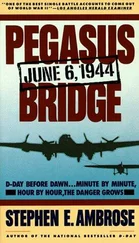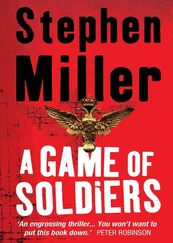Stephen Ambrose - Citizen Soldiers [Condensed]
Здесь есть возможность читать онлайн «Stephen Ambrose - Citizen Soldiers [Condensed]» весь текст электронной книги совершенно бесплатно (целиком полную версию без сокращений). В некоторых случаях можно слушать аудио, скачать через торрент в формате fb2 и присутствует краткое содержание. Жанр: История, на английском языке. Описание произведения, (предисловие) а так же отзывы посетителей доступны на портале библиотеки ЛибКат.
- Название:Citizen Soldiers [Condensed]
- Автор:
- Жанр:
- Год:неизвестен
- ISBN:нет данных
- Рейтинг книги:5 / 5. Голосов: 1
-
Избранное:Добавить в избранное
- Отзывы:
-
Ваша оценка:
- 100
- 1
- 2
- 3
- 4
- 5
Citizen Soldiers [Condensed]: краткое содержание, описание и аннотация
Предлагаем к чтению аннотацию, описание, краткое содержание или предисловие (зависит от того, что написал сам автор книги «Citizen Soldiers [Condensed]»). Если вы не нашли необходимую информацию о книге — напишите в комментариях, мы постараемся отыскать её.
Citizen Soldiers [Condensed] — читать онлайн бесплатно полную книгу (весь текст) целиком
Ниже представлен текст книги, разбитый по страницам. Система сохранения места последней прочитанной страницы, позволяет с удобством читать онлайн бесплатно книгу «Citizen Soldiers [Condensed]», без необходимости каждый раз заново искать на чём Вы остановились. Поставьте закладку, и сможете в любой момент перейти на страницу, на которой закончили чтение.
Интервал:
Закладка:
ON HILL 317 the position was precarious-no food, ammunition running low, and worst of all, the radio batteries were dying. Sergeant Sasser retrieved discarded batteries and set them out on rocks. The sun restored some life. He switched batteries several times a day, restoring one set while using another. Even so, by the end of the fourth day, it was doubtful that he could keep them going.
The GIs had long since cleaned out the chicken coops and rabbit pens around the half-dozen farms on the hill, along with the fruit and vegetable cellars, and were eating raw vegetables gathered from the gardens-when they got anything to eat. Medical supplies had long since run out. After the fourth day Weiss reported, "We could see no end." Incoming radio messages told the 2nd Battalion to hold on, help was coming. But when?
Lieutenant Ralph Kerley commanded E Company of the 2nd. After four days and nights of fighting, he was exhausted, discombobulated, but he kept at his work. At midmorning of the fifth day, studying the panorama below him through binoculars, he spotted a German mortar crew served by a half-dozen men.
"Sergeant," he called out to the leader of his own mortar team, "how many rounds do you have left?" "One, sir."
Kerley paused, thought about what relief it would bring if he could put that mortar out of action, thought about the danger he would be in if he was out of shells. "Do you think you can hit the son of a bitch?"
"Yes, sir. I reckon I can."
"Then blow his ass off."
The sergeant gathered up his crew and brought the 60-mm mortar assembly forward. Kerley watched the enemy mortar crew loafing, lying around, sunbathing, laughing. Occasionally one man would stroll back into the bushes and emerge with a shell, drop it down the tube, and shortly thereafter the shell would explode to the right or left, showering Kerley with rocks and dirt.
Kerley studied his map, turned to the sergeant, pointed, and said, "Put it right here."
The sergeant made his own survey with his binoculars. A private, his M-l slung across his back, clutched the sole remaining mortar shell for dear life against his belly. Kerley and the sergeant talked quietly about wind, distance, elevation, made adjustments on the elevating screw. One last consultation, one minor adjustment.
Satisfied, the sergeant turned to the rifleman with the mortar shell. The private stretched his hands out to the sergeant as if passing off a newborn baby. The sergeant took the shell, kissed it, dropped it in, ducked, and called out, "On the way." Kerley steadied his glasses, peering intently, holding his breath.
Klaboom! The shell exploded less than ten metres from the enemy mortar team. Two of the men leapt up and dashed away. Two others grabbed their mortar and ran. Kerley started breathing again. "Nice work, Sergeant," he called out.
ON AUGUST 11 Kluge finally got Hitler's permission to break off the attack at Mortain and begin the retreat through the Falaise gap. It was a momentous, if inevitable, decision, because once the retreat began, there was no place to stop, turn, and defend short of the Siegfried Line at the German border. The line of the Seine could not be defended: there were too many bends in the river, too many potential crossing places to defend. Once the retreat began, the Battle of France had been won.
At 1430 on the fifth day of the siege of Hill 317, August 12, the 35th Division broke through the German lines and relieved the 2nd Battalion on Hill 317. Of the 700 GIs on the hill, some 300 were dead (including Sergeant Corn) or wounded. Lieutenant Weiss had called in 193 fire missions while the battalion had been surrounded. After eating and getting some sleep, he wrote his after action report on a typewriter, hunting and pecking. It was ten pages long. Summing up what he had learned from his five-day ordeal, Weiss wrote: "Although quite often beat back and silenced, at the slightest carelessness in exposing ourselves thereafter, the enemy would strike back at us. He doesn't quit. His aggressiveness demands a twenty-four-hour observation."
Then Weiss wrote a letter to his father: "Not much to write about from here."
THE SPECTACULAR performance by 2nd Battalion, aided by the remainder of the 30th Division, had stopped the German thrust to the coast. Altogether the Germans lost more than 80 per cent of the tanks and vehicles they had thrown into the Mortain attack. Now their entire army in Normandy was threatened. The rush to get out, to get over the Seine and back to Germany, was on.
By no means did all the Germans participate. Slackers, defeatists, realists seized their opportunity to surrender, convinced that becoming a POW in British or American hands was their best chance of survival. Captain John Colby remembered: "One dark night we pulled off the road. One of our guys lay down to sleep beside an already sleeping German soldier who had become separated from his comrades and had lain down here for the night. When the German awoke the next morning he shook the American to arouse him and then surrendered to him."
But by no means were all the Germans surrendering. The toughest units and the most fanatical Nazis-panzer and Waffen SS troops-were determined to get out so as to fight another day.
On August 14 Eisenhower issued a rare order of the day (he sent out only ten in the course of the war), exhorting the Allied soldiers: "If everyone does his job, we can make this week a momentous one in the history of this war-a brilliant and fruitful week for us, a fateful one for the ambitions of the Nazi tyrants." The order of the day was broadcast over BBC and distributed to the troops in mimeographed form.
The following day Eisenhower held a press conference. There was great excitement among the reporters, who had earlier been gloomy about the stalemate in Normandy and were now optimistic about what lay ahead, as evidenced by the first question Eisenhower received: "How many weeks to the end of the war?"
Eisenhower, disturbed by the excessive optimism, exploded. He said such thoughts were "crazy." The Germans were not going to collapse. He predicted that the end would come only when Hitler hanged himself, but warned that before he did, he would "fight to the bitter end," and most of his troops would fight with him.
IF NOT MOST, enough. The Canadians did not get to Falaise until August 17 and then failed to close the gap between Falaise and Argentan. The German army still had an escape route open. For sheer ghastliness in World War II nothing exceeded the experience of the Germans caught in the Falaise gap. They were in a state of total fear day and night. They seldom slept. They dodged from bomb crater to bomb crater. "It was complete chaos," Private Herbert Meier remembered. "That's when I thought. This is the end of the world."
German army, corps, and division headquarters got out first and headed towards the Siegfried Line. Most junior officers felt like the enlisted men- it was every man for himself.
"It was terrible," Lieutenant Giinter Materne recalled, "especially for those lying there in pain. It was terrible to see men screaming 'Mother!' or 'Take me with you; don't leave me here! I have a wife and child at home. I'm bleeding to death!'"
Lieutenant Walter Padberg explained: "Honestly said, you did not stop to consider whether you could help this person when you were running for your life. One thought only of oneself."
"All shared a single idea," according to Corporal Friedrich Bertenrath of the 2nd Panzer Division. "Out! Out! Out!"
All this time, bombs, rockets, mortars, and machine-gun fire came down on the Germans. Along the roads and in the fields dead cows, horses, and .soldiers swelled in the hot August sun, their mouths agape, filled with flies. Maggots crawled through their wounds. Tanks drove over men in the way-dead or alive. Human and animal intestines made the roads slippery.
Читать дальшеИнтервал:
Закладка:
Похожие книги на «Citizen Soldiers [Condensed]»
Представляем Вашему вниманию похожие книги на «Citizen Soldiers [Condensed]» списком для выбора. Мы отобрали схожую по названию и смыслу литературу в надежде предоставить читателям больше вариантов отыскать новые, интересные, ещё непрочитанные произведения.
Обсуждение, отзывы о книге «Citizen Soldiers [Condensed]» и просто собственные мнения читателей. Оставьте ваши комментарии, напишите, что Вы думаете о произведении, его смысле или главных героях. Укажите что конкретно понравилось, а что нет, и почему Вы так считаете.
![Stephen Ambrose Citizen Soldiers [Condensed] обложка книги](/books/346737/stephen-ambrose-citizen-soldiers-condensed-cover.webp)








